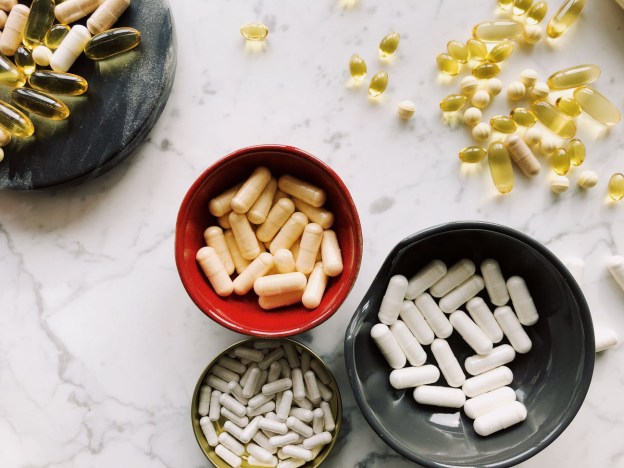Continuing my hair care series, I thought this topic is definitely worth writing about. Biotin (vitamin B7) supplements has been widely popularised for the treatment of hair fall and thinning hair. It’s promised to help grow long, thick, luscious hair and for healthy nails as well.
But is there a rational scientific evidence behind this popular trend?
I’m here to discuss the science (or more like the lack of it) behind the use of biotin supplements for hair loss.
What is biotin?
Biotin is a water soluble vitamin, and functions as a co-factor for various enzymes responsible for energy production in our body. Being water soluble means it does not get stored in the body and is excreted in the urine via the kidneys. So chances of toxicity from over consumption of biotin is minimal and so far there has not been any adverse effects from biotin supplementation. This being said, biotin supplementations for general well being or for healthy nails and hair is still not justified!!
The recommended daily allowance of biotin is 30 µg per day.
And we meet this requirement adequately from our diet.

If less is good, is more better?
from my dermatology text book
My answer to this question when it comes to nutrients for our body, is NO!! More is definitely not better and more is actually un necessary.
So why is biotin heavily popularised?
Few reported cases of biotinase (an enzyme required for recycling biotin in our body) deficiency was reported in infants and children who inherited the disease due to genetic mutations. It was noted that few of these cases had alopecia (hair loss) with or without brittle nails. Biotin helped improve the hair and nail changes in these cases.
Thus stemmed the popular trend of biotin supplements for hair fall or nail disorders.There is no regulation on vitamin supplementation production, hence pharmaceutical companies take advantage of this and advertise and market biotin supplements as a saviour for hair loss.
Note: in these cases describes above, biotin was a treatment of choice because they lacked biotin in their body.
Biotin deficiency in general population is very rare as we get adequate amounts from our diet. Supplementation of high doses (500-1000 µg/ day when the required amount is only ~ 30 µg/ day) is highly unjustified.
The few rare instances when a person can develop biotin deficiency are:

So does biotin also improve hair loss in healthy individuals without its deficiency?
There has never been any scientific study on the effectiveness of biotin for the treatment of hair loss in healthy individuals.
A study on 541 women with hair loss, showed that only 38% of these individuals had biotin deficiency of which 11% had histories on being on long term medications that can cause biotin deficiency and 35% of these women also had co-existing skin condition called seborrheic dermatitis, which shows that in individuals with hair loss, majority had normal levels of biotin and supplementation was un-necessary.
Even lab studies found that the differentiation and proliferation (growth) of the follicular keratinocytes (cells in the hair follicle) was unaffected by the level of biotin.
Biotin supplementation is not the treatment for hair loss/ hair thinning nor does its intake help aid other scientifically proven treatments for hair loss
Can biotin supplements do any harm?
Like I’ve mentioned earlier, there are no known toxicities reported so far as a result of biotin supplementation.
However, excessive amount of biotin in the blood can interfere with many of the laboratory investigations such as thyroid function tests, other hormonal profiles as well as levels of troponin in the blood (which is an indicator of a heart attack).
Many lab tests rely on a biotin-streptavidin reaction as part of the test procedure. The low amount of biotin we obtain from our diet does not affect these tests however biotin level > 1 mg/ day (Biotin supplements available in the market contains around 10mg of biotin) can result in false positive or false negative test results.
FDA issued a warning to help educate about the possible interaction between high biotin levels in the blood and troponin level ( a biomarker which helps physicians diagnose a heart attack for patients presenting with chest pain). This could be dangerous as a heart attack requires immediate treatment and an early diagnosis could potentially be missed.
My take on this topic
- Biotin supplements are not required for the treatment of hair loss.
- If you are on long term supplements, remember to mention it to your treating physician especially if you are getting evaluated for hormonal issues, thyroid function or for a chest pain.
- Follow the general hair grooming measures available on a post on my instagram feed.
- Get the hair loss evaluated by a dermatologist to get to the cause of it as different types of hair loss requires different form of treatment.
- Instead of wasting your money on buying these vitamin supplements, spend it on products that have actually proven to work such as minoxidil, or well formulated shampoos and conditioners instead.

Hi I feel so bad Seeing a lot of hair fall out it can be frustrating and I heard about this product https://www.biotinxtremehaircare.com/products/biotin-shampoo has anyone used?
LikeLike
I doubt it would work. I’m sorry to having excessive hair loss. Try to get a professional opinion to find out why your hair is falling out so as you can care for it accordingly.
LikeLike